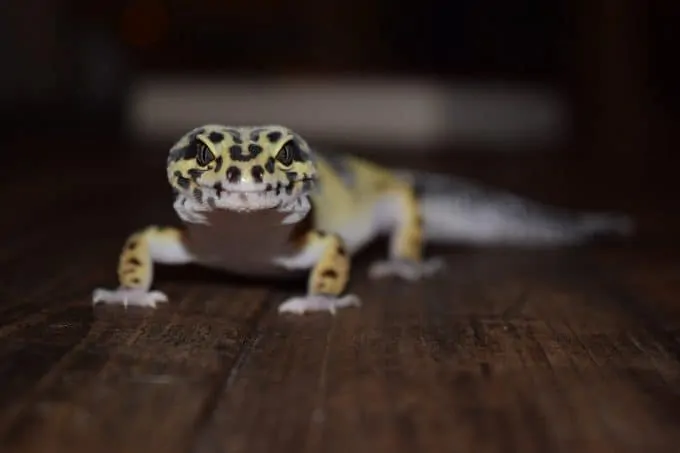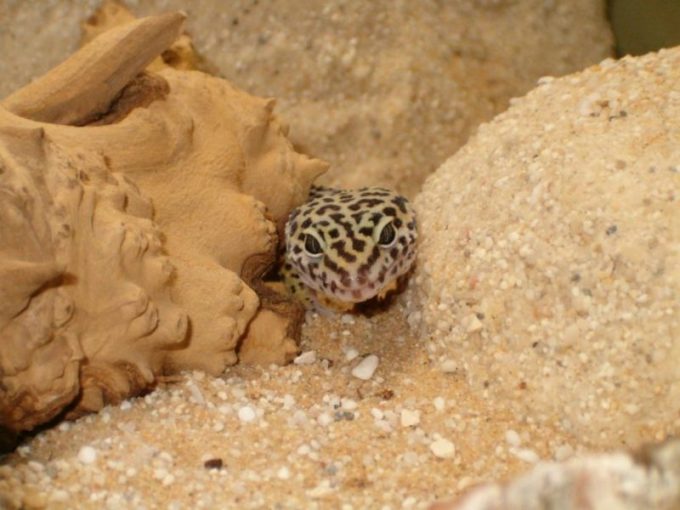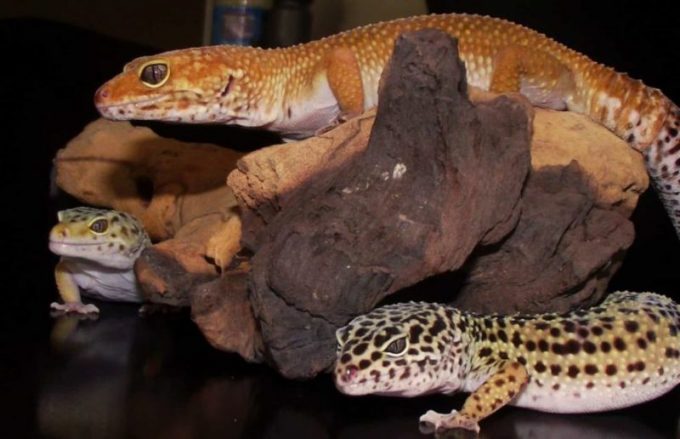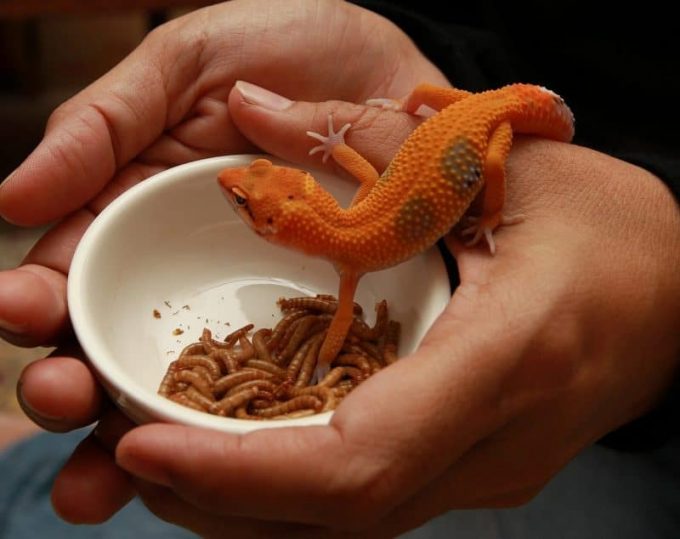Although the docile, “smiling” leopard geckos may seem to be cool about everything and anything, they can get stressed as well. Prolonged stress is unhealthy and can seriously degrade your leo’s wellbeing.
Fortunately, although they really can’t warn us about what is going on, the stress in leopard geckos is usually visible, solvable, and preventable.
Let’s see what might stress your dear pet leopard gecko, and what can you do about it.
> Recommended Reading: How To Tell If Your Leopard Gecko Is Happy?
Is My Leopard Gecko Stressed? What Are the Signs and the Causes?
Here is the list of most common stress signs in captive leopard geckos:
- Stress Licking
- Stress Waving
- Vocalizing
- Excessive Hiding
- Closed Eyed
- Glass Surfing
- Cohabitation Stress
Stress Licking
Leopard geckos use their tongues to sniff out their environment. They will readily do it when they are in the exploration mode. You can observe this behavior when you take your leo out of the tank – he will be diligently soaking in the smells of his environment with the help of that cute stubby tongue.
However, if you notice your gecko is doing the licking too much, it can be a sign of a severe issue. Mouth rot is a serious condition that is often accompanied by excessive licking, as well as by some or all of the following symptoms:
- Gaping mouth.
- Lack of appetite.
- Mucus, or puss around the mouth.
- Willing to eat, but unable to pick up food.
In many cases, mouth rot is precluded by a drop in immunity caused by long-term stress.
The condition has to be treated by a reptile vet immediately. After a, hopefully, successful healing, you should completely review your gecko’s everyday living conditions.
Eye Licking is a separate issue. Leos will normally lick their eyes to keep them clean and moist. However, if you notice your pet is licking them too much, it can signal a stuck shed, something else stuck in the eye that they can’t get rid of.
> Read more: The Leopard Gecko Behavior (Common & Unusual)
Stress Waving
Leopard geckos will sometimes wave or shake their tails in favorable circumstances – like when stalking prey, or when courting a female.
However, most of the time, waving the tail simply means “Stay away. Don’t touch me.” Leos will usually wave in an attempt to fend off a threat – a competitor, a predator, or any creature they feel threatened by.
If your leopard gecko is young and brought to your home just recently, tail waving will be a normal reaction before you try to handle him. He is trying to ward you off, but if you’re patient and not pushy, he will soon learn that you are not a threat. But try to leave him alone as soon as he shows these signs and take it one step at the time.
> Read more: What to Do If Your Leopard Gecko Drops Its Tail
Vocalizing
When bothered, a leopard gecko will produce a squeaking, chirping, or a quacking sound. Vocalization has the same function as tail waving, so you should do the same – when you hear him squeak while being handled, loosen up your grip or put him back in the tank.
Excessive Hiding
Excessive hiding can mean various things.
In the case you got your leopard gecko only recently, hiding is pretty normal behavior. He needs some time to adapt. As long as he is not on a hunger strike, let him hide for up to several weeks.
However, excessive hiding beyond this period could be a sign that something is wrong with either your leo’s environment or his health. Check for these issues:
- Is your leo too cold? Geckos in cold tanks with no heat spot will often hide to conserve energy.
- Is your gecko too hot? If your leo is always hiding in the cool part of the tank, check the general temperature, as well as the temperature at his basking spot under a heat lamp.
- Do leo’s limbs and spine look normal? Lethargy and difficulty moving are common features of Metabolic Bone Disease (MBD), a dangerous condition that occurs because of a lack of calcium and vitamin D3.
Closed Eyes
If the gecko is sluggish and keeps his eyes closed often, first check if the temperatures are too low.
Eyes that are closed too often in an otherwise healthy gecko can also signal that the lights in his tank are too bright, and/or that he doesn’t have a hide he likes.
If you have determined that nothing is wrong with his environment, you must know that closed eyes and lethargy can also signal several problems – an illness such as the aforementioned MBD, parasites, and many other alignments. Also, a leo will close his eyes if he is in pain.
Glass Surfing
Glass surfing or glass dancing is a sign that a gecko is distressed and wants to escape the uncomfortable situation. Cohabitation stress, mites in the tank, too much heat, a tank that is too small or even too dull can all trigger glass surfing.
Sometimes a glass surfing event will appear from no obvious reason and will simply pass. If the mysterious dancing sessions are re-occurring, then you should pay much closer attention to the possible triggers.
Cohabitation Stress
Leos are solitary animals. They don’t need each other’s company. However, two or more females can tolerate each other, which has made the cohabitation popular.
However, incidents are sure to occur, especially during feeding time. Most leos are agile and aggressive hunters. When they turn this aggression onto each other during feeding time, things can get nasty really quickly.
In general, we don’t recommend cohabitation.
Can Fans Stress out a Leopard Gecko?
Sometimes, fans are used in terrariums to increase air circulation. They are more common in moist, rainforest setups than in dry, desert-type tanks suitable for geckos.
However, if you live in a home with high humidity levels, a fan may do wonders for preventing the humidity buildup inside the tank.
If positioned right, a small, PC-type fan will not stress out your leos. Preferably, it should be attached to the back wall high up in the tank near the ventilation, so the air will circulate under the ceiling and not on the ground where the lizard is.
The air should never blow at or over your leopard geckos!
> Read more: Leopard Gecko Habitat: How to Set Up The Ideal Tank?
Does UVB Light Stress Leopard Geckos?
Unfortunately, this is another subject about which the answers just aren’t yet clear. It is certainly possible that UVB radiation is stressful to leopard geckos — even if they can’t consciously perceive it.
However, we do know that bright lights of any kind do appear to be stressful for leopard geckos. This doesn’t mean that you must keep them in the dark all the time, but it means they should always have hiding places available that they can retreat to, if desired.
So, it is likely wise to use UVB lights with care, and always be sure that your lizard has a dark place he can use to get away from the lights if they are bothering him.
> Read more: Leopard Gecko Lighting Needs and Requirements
Can Crickets Stress Leopard Geckos?
As mentioned earlier, crickets can be a great snack, but a terrible cohabitant in the terrarium. They can bite and even stalk your pet leo and cause him quite a lot of aggravation.
Always make sure that all the crickets in the tank are eaten when you are feeding them. Don’t let a single one remain in the tank.
Can Leopard Geckos Die Of Stress?
Geckos won’t die from the stress itself, but rather from the underlying causes of stress – such as disease or mismanagement.
That is why it is very important to pinpoint the causes of strange stress-related behavior, so you can address the causes ASAP before serious damage is done.
> Further reading: Leopard gecko dying signs
Do Leopard Geckos Like to Be Held?
Leopard geckos do not have a need to be held and cuddled as your dog has.
However, most leos are tolerant of being handled, and some even like it (in reasonable quantities). The attitude will also depend on your gecko’s personality and previous experiences when being handled.
What my leos love the most about handling is the warmth of human hands. Remember that our palms radiate heat, which goes normally reaches 37 degrees Celsius. Almost like a heat rock!
If you plan to hold your leo often, tame him at a young age.
What Are the Solutions to Avoid Stress in Leopard Geckos?
- Doing a lot of research from reputable sources before picking your pet and bringing it home (find out more in our Leopard Gecko guides).
- Arranging his terrarium in line with the best-recommended practices is absolutely the best way to avoid stress in leopard geckos. Note that pet stores are usually not the best places to get your information from.
- Finding a healthy individual with good genetics is also ensures that the animal will not suffer stress from being improperly kept in the trade. Getting your pet from a reputable leopard gecko breeder is usually enough to ensure that your future pet will start his new life in good shape.
- Do not handle your leos too much. Stop when you see that your leo is getting restless and nervous and put him back into his tank. When you do handle them, do it without squeezing or pulling. Allow natural movement, but control it at all times.
- And last but not least, feeding your gecko the right food with just enough supplements, and paying close attention to safety when feeding them feisty feeders such as crickets and superworms will also do wonders for your gecko’s stress-free life.
Take Care!
Stress is a common occurrence in all living creatures, but the most important thing is to recognize it and address it in time. With a little bit of reading and experience, the signs of stress are easy to spot, and, in most cases, the issues are easy to resolve.
Building an optimal, healthy environment is the prime way to provide your leo with a lifetime of health and happiness.
I hope this article has given you the knowledge that will help your leopard gecko have a quality, stress-free life.
What’s your experience with stress in leopard geckos? Do you have any stress-signs to add to our list? Feel free to post a comment below!






13 Comments
Hey! I’ve had my leopard gecko for about 4 years now and he used to be the friendliest guy ever and all of a sudden he doesn’t want to be touched, he is eating but not as much as usual, I took him out his cage and he started rapidly trying to run away so I put him back in his tank and he was waving his tail. I put some more food in for him and changed his water but while I was doing this he started running around his cage again. Should I be worried about this? I’m really unsure on what to do because I’ve researched about this and can’t seem to find anything or anyone else who also has this issue????
Hi, I hope that your situation has been resolved by now. Perhaps leo has been through a stressful event while being handled (too much handling can be a stressful event of its own kind), but being springtime, I am more convinced that he was somehow triggered into a breeding season mode. In males, the breeding season behavior can feature aggression, hyperactivity, and lack of interest in food. If you perhaps brought a female leopard gecko home, that explains it all. However, if the behavior persists beyond springtime OR you notice any other symptoms, I would definitely recommend a vet check-up because otherwise tame leos can also act like this when in pain.
My son had a leopard gecko and he was changing the tank outside and the leopard was fine then started to shake her head from side to side then stopped but she died. She was not outside long. I don’t know what happed it was all of a sudden she is fine then passed away.
I’m sorry to hear about your son’s leopard gecko. Leopard geckos are delicate creatures and can die easily if they’re not cared for properly. It’s possible that the temperature change from being inside to outside was too much for her, or that she didn’t have enough food or water.
Hey, I think I just stressed my gecko out…I was feeding him and he mistook his poop for a roach and tried to eat it, which I blocked him from doing so amd he spazed out and tried to escape his tank. For the past 10 minutes the poor guy has been waving his tail on his dry hide. Is there anything I could do in the future to prevent him from freakimg out? I just didn’t want him to eat his poop and get sick…
Hi Claire,
It just sounds like you gave him a bit of a fright, geckos will freak out if things come from above them, especially if it’s very quickly as they are preyed on by birds in the wild. If something like this happens again, try to move calmly and at his level.
I got my leo about 3 weeks ago. I had to take her to the vet due to her not eating nor drinking they gave me some meds cuz they think that she had a parasite of she wasnt able to go to the bathroom (enrofloxacin 0.25 mgs and metronidazole 2.5 mgs. 2.0 ml once a day.) she still will not eat nor has she went to the bathroom (poop). she has shed 2 time since I had her and i’m not sure what to do.
Hi Ladybugg,
Sometimes the change of environment can cause geckos to stop eating but 3 weeks is quite some time. You will need to allow a few days for the medicine to begin working, if she doesn’t get better you should take her back to the vet for a second opinion or further treatment. In the meantime, check your habitat setup, temperatures, humidity and lighting. I hope she gets better soon.
Sometimes while resting on my hand, my female leo will kind of squat down and then kick her legs backwards kind of like a dog does after it goes to the bathroom. What is she doing?
Hey there, Sunny.
It’s hard to know exactly what’s going on with your pet based on your description. Sometimes, lizards who’re impacted will kick their back legs out, but I’m not sure if that’s exactly what you’re describing.
We’d recommend videoing the behavior and, if you’re concerned, sharing it with your veterinarian.
Best of luck!
Tokek saya lesu, mata sering tertutup, kurangnya nafsu makan seiring waktu, dan sering kali saya mendapatinya menggaruti badannya, saya khawatir akan hal itu namun saya terus mencoba mencari jawaban tersebut, apa yg harus saya lakukan?
Baby gecko feeding difficulties, can go weeks without eating.
this was VERRY helpful